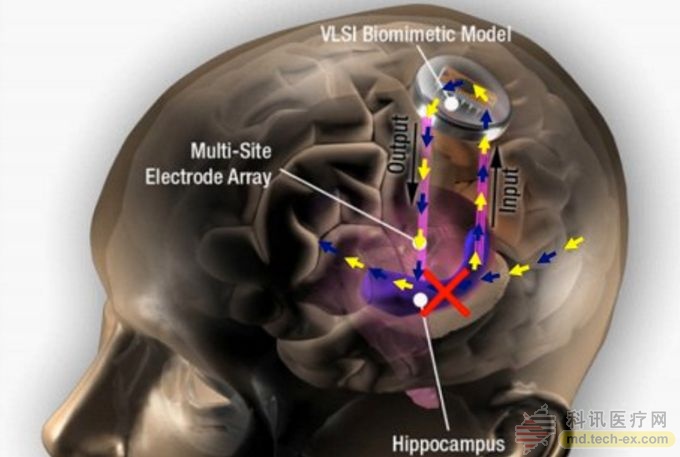Release date: 2016-08-26

A new company called Kernel has developed a mysterious model: by implanting diagnosable brain prostheses to help people with memory problems. The project has a broad target market, including those with Alzheimer's or other forms of dementia, as well as those with brain trauma.
If the company's model works, then in the future, doctors will implant the micro-devices developed by Kernel into the patient's brain—precisely, implanted into a part of the brain called the hippocampus. The electrodes of this implanted device stimulate electricity by stimulating certain neurons to help the brain work, such as translating external information into the brain into long-term memory.
The development of this prosthesis was based on a study led by Ted Berger, director of the Center for Neuroengineering at the University of Southern California. Berger told Pope Magazine that experiments in mice and other primates made him believe that the time was ripe and it was time to put the prosthesis into clinical trials. He said: "We are testing this prosthesis in the human body and have achieved quite good initial results. We will go further in the future and strive to commercialize this prosthesis."
"Popular Magazine" specifically reports Berger's pioneering achievements in memory prosthetics, hoping to use this as an opportunity to stop people from suffering physical, emotional and intellectual disabilities.
In Berger's research, when some neurons receive new information, the electrode material in the hippocampus will record the electrical signals and translate them into a certain memory code. These electrical signals are emitted by neurons in specific areas. What Berger studies is how external information is converted into electrical signals and stored in the brain as long-term memory. Then, his lab established a mathematical model that can accept information and produce corresponding output signals, that is, a model that converts external information into memory.

In the process of receiving information, the electrodes of the implanted memory prosthesis record a signal, which is equivalent to a microprocessor to perform the calculation. The electrodes then stimulate the neurons and encode the information for long-term memory.
For patients who have difficulty forming long-term memory, this prosthesis will help them. Berger said: "We will get these memory codes and put them back in the brain. If we can implement this, then this prosthesis will be ready for use."
Advance research in memory prostheses, such as Berger and other neuroengineering researchers, has received funding from the US Department of Defense's Advanced Research Projects Agency, and during this decade they have also worked on clinical device development.
But the main funding for Kernel's new startup project is still from technology entrepreneur Bryan Johnson. He sold his payment company to PayPal (the world's largest online payment platform) for $800 million in 2013. Johnson has since started a venture called OS Fund Ventures, an investment project designed to "rewrite the operating system of life" for the benefit of mankind. USC's Berger said that Johnson not only hopes to earn the next $800 million through Kernel, he has new challenges in the next step - improving his brain ability.
Funding will provide more human testing, such as temporary placement of electrode materials in hospitalized epilepsy patients as part of routine treatment. In the human test conducted so far, the researchers recorded data from the hippocampus during the memory test, and also stimulated the hippocampus with electric shock to improve the patient's memory.
The science of memory formation still has many basic questions waiting to be answered, which also reflects the constructive role of the Kernel founding team in developing such clinical devices. For example, is there a common code for memory? If two people remember a string of identical words, do their electrical signals match? Or do they use signals of the same pattern to encode information and remember it?
Berger said that when experimenting with mice, the researchers did find "meaningful co-coding," but no such code was found in primates. Despite this, he added that they only experimented with a small number of primates and therefore lacked a large enough data set to analyze. As for humans, even if there is such a universal memory code, it is difficult to apply it with the current technical capabilities.
The crux of the problem is that humans have far more neurons than white mice—there are more than 86 billion neurons, and the mice have only about 200 million. Therefore, electrodes implanted in the hippocampus of the human body can only record a relatively small proportion of data. Berger said: "What we can record is only some neuron-based information." Therefore, one of the goals of the Kernel project is to develop a plant with dense electrode arrangement that can record more information from neurons. Into the body.
Assuming that the Kernel project can successfully turn the basic science into an actual product, this is not the first brain implanted prosthesis that hits the market. Implantation techniques have been used as early as deep brain stimulation. This has also become part of the treatment of Parkinson's disease, as well as experimental treatments for depression and many other neuropsychological disorders. In 2013, the regulator approved the first brain implant surgery for patients with epilepsy. The implant can monitor the brain and prevent the onset of epilepsy.
There are indications that the era of bionic brains is coming, so stay tuned.
Source: Lei Feng Net
Tattoo Nitrile Gloves,Disposable Nitrile Gloves,Powder Free Cheap Glove,Blue Disposable Nitrile Gloves
Puyang Linshi Medical Supplies Co., Ltd. , https://www.linshimedical.com